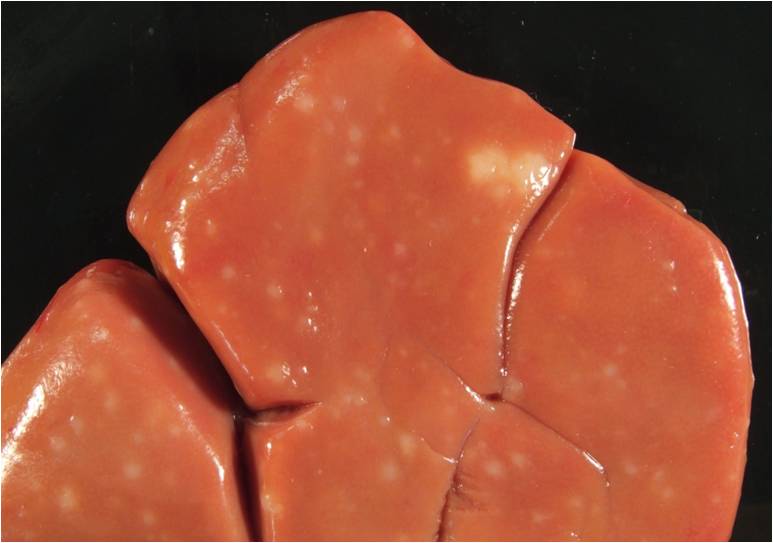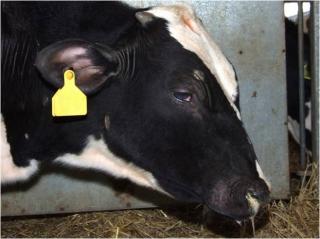Malignant Catarrhal Fever: Disease That Affects Cattle Productivity Worldwide
Published on 26 January 2010 in Food, health and wellbeing
Introduction
MCF is an infectious disease of cattle, deer and related species caused by a group of herpesviruses that are carried without symptoms by other ruminants – sheep and goats in the UK. Most sheep in the UK carry the MCF virus Ovine herpesvirus-2 (OvHV-2), becoming infected during the first months of life. Most virus is shed by lambs at this time and so they present a risk of MCF to in-contact cattle and deer.
MCF is almost invariably fatal in susceptible species and while it usually affects individual animals there are occasional outbreaks in which up to half a herd can be lost. The clinical signs of MCF include high fever; discharge from eyes and nose; and lesions on the muzzle and oral cavity. These signs can be similar to other diseases including mucosal disease, foot-and-mouth, and bluetongue, making accurate diagnosis important. Cattle may survive for a week or two after the onset of MCF clinical signs, while deer (and bison) are more susceptible and survive no more than a few days. Importantly, there is no treatment or vaccine for MCF, so affected animals die or are culled for welfare reasons.
Key Points
Research at Moredun has made progress in the following areas:

(i) Diagnostic tools. We have developed and implemented DNA-based diagnostic tests for three MCF viruses (now in use by the MRI Virus Surveillance Unit). Moredun performs MCF surveillance for the whole UK and also receives samples from diagnostic laboratories worldwide.
(ii) Understanding the mechanism of MCF for improved therapy and advice. By studying how the virus interferes with the host immune system, we have defined potential autoimmune pathways that may explain how MCF kills susceptible animals but not carriers.
(iii) MCF vaccine development. We have exploited an attenuated MCF virus strain to develop a protective vaccination method for cattle. Field trials of this candidate vaccine are now required.
Research Undertaken
This project has a strong multidisciplinary element, exploiting expertise within Moredun in areas of molecular biology, veterinary pathology, proteomics, immunology, bioinformatics and clinical studies.
Diagnostic research is aimed at making identification of MCF cases more reliable. Previously, diagnosis by immunofluorescence required a skilled operator to interpret the results. We have developed three virus-specific, quantitative PCR tests for sensitive, reliable detection of MCF virus DNA in blood samples. We have also produced ELISA tests to measure MCF-specific antibodies in the blood of infected cattle and other species, such as valuable zoo animals that could be exposed to MCF in mixed collections.
Research on how MCF virus infection causes disease in cattle has been greatly helped by the sequencing of the OvHV-2 genome. Molecular, cellular and recombinant virus studies have allowed us to define the function of key virus genes and how they interact with components of the host immune system. This has shown us how virus genes can modify the host immune response to make the disease worse rather than better. This research may have implications for human diseases that appear to work in a similar way, e.g. celiac disease.
We are now using genomic methods such as microarrays and next-generation sequencing to obtain a global picture of the molecular events that underlie disease. This will be one route to identifying potential therapeutic candidates.
Vaccination against MCF has been tried many times without success, but by using more realistic route of infection (intra-nasal), scientists at Moredun have shown that vaccinating cattle with an attenuated strain of MCF virusprotects them from a normally fatal challenge. This is the first demonstration of reliable protection against MCF and is particularly significant as most herpesviruses cause lifelong infections that are difficult to immunise against.
Policy Implications
- Control of common endemic diseases is important in increasing productivity and food security for Scotland. Reducing disease losses also increases efficiency and reduces the environmental impact of farming, whilst supporting the rural economy.
- Over 300 cattle in the UK die of MCF each year with an estimated cost to the UK livestock industry of approximately £0.5M per annum across both beef and dairy sectors. As well as affecting cattle, MCF is the most serious viral disease of farmed deer and is the major constraint to the developing bison industry in the UK.
- There is currently no disease control for this devastating condition. Improved diagnostic tests developed at Moredun have already had an impact for farmers and veterinarians worldwide. Scientists at Moredun are leading the world in MCF vaccine development with a candidate MCF vaccine that is ready for field trials. New vaccines and tests benefit farm animal welfare and agricultural economics directly.
- Research at Moredun on MCF is underpinning the knowledge required to develop new, improved control methods. This knowledge is distributed to vets and farmers as soon as possible. Disease surveillance at Moredun is vital to detect emerging diseases and changing patterns of endemic diseases.
- MCF is a global problem and has significant development and economic implications in Africa, where it is an important disease affecting the cattle of Massai pastoralists. Moredun is currently developing a collaboration to conduct MCF vaccine trials in Massai cattle.
Author
Dr George Russell george.russell@moredun.ac.uk
Topics
Food, health and wellbeing
Comments or Questions









